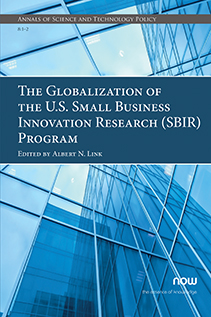SBIR in The Netherlands
By Martijn van Hasselt, University of North Carolina at Greensboro, USA, mnvanhas@uncg.edu
Abstract
This monograph provides an overview of the Small Business Innovation Research (SBIR) program as currently implemented in The Netherlands and reviews the available empirical evidence about its impact. The program was partially modeled after the US SBIR program and was first piloted in 2004. There are currently three variants of the program, executed by distinct government agencies. SBIR does not provide subsidies or grants, instead it is a pre-commercial procurement program, under which a government agency enters a contractual agreement with a private business to develop innovations and prepare them for commercialization. Like US SBIR, the program is competitive and takes a phased approach to funding. Two of the three variants specifically aim to stimulate the development of innovative solutions to large societal challenges. All three variants further aim to strengthen the innovative capacity of small and medium enterprises. The few program evaluations conducted to date provide limited empirical evidence about the realized benefits of SBIR in The Netherlands. It appears that the program remains somewhat underutilized, but survey evidence obtained from program participants suggests that SBIR stimulated the development of highly innovative products and services, which in turn led to further research and development investments and spillover effects to other firms and sectors in the economy.
The Globalization of the U.S. Small Business Innovation Research (SBIR) Program
The Globalization of the U.S. Small Business Innovation Research (SBIR) Program presents how SBIR programs have spread across the globe. The U.S. SBIR program has become a template for legislation in other countries that seek to enhance the innovative nature of small firms. This special issue presents works by leading eminent scholars who describe individually the population of international emulated programs. The works are ordered by the date that the country adopted an SBIR-like program, including Turkey (1995), Australia (1996), Brazil (1997), South Korea (1998), Japan (1999), Taiwan (1999), United Kingdom (2001), The Netherlands (2004), and New Zealand (2012).

Companion
Annals of Science and Technology Policy, Volume 8, Issue 1-2 Special Issue: The Globalization of the U.S. Small Business Innovation Research (SBIR) Program
See the other articles that are also part of this special issue.